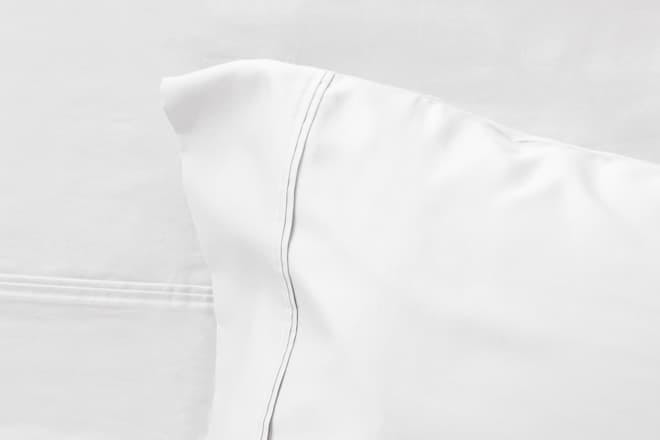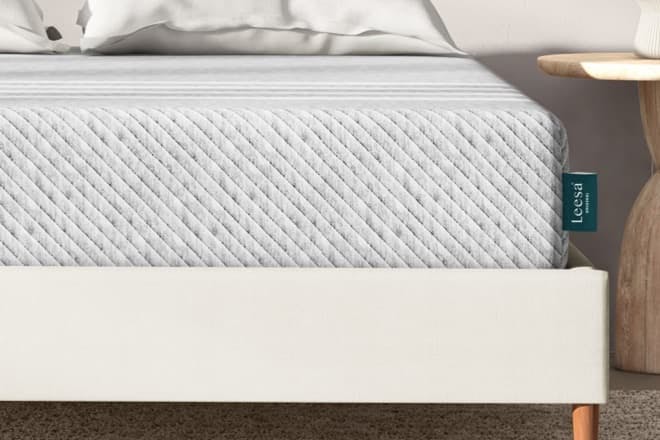So you've found your perfect Leesa mattress, but you're still waking up with a stiff, sore neck. Maybe it's time to upgrade your bed cushion, aka your pillow. Just like mattresses, there are different types of pillows, each catering to different preferences or sleeping habits.
Whether you’re a back sleeper, a side sleeper, or have health conditions, there’s a perfect pillow here for you.
Bed Cushions Designed to Help with Sleeping Conditions
If you have back pain, sleep apnea, or acid reflux (heartburn), you know these conditions can disrupt your sleep. And if you have been (or are) pregnant, you probably know how difficult sleeping can be, especially in the third trimester. But did you know choosing the right pillow or bed cushion can help?

Wedge Bed Cushions
A wedge bed cushion can be a lifesaver if you're a back sleeper, pregnant, or suffer from acid reflux (GERD) or sleep apnea. By placing the wedge cushion under your knees, you'll experience reduced lumbar pressure. That means you'll wake up with less lower back pain.
Some medical issues require you to sleep with your head slightly elevated. These include acid reflux and some respiratory conditions, whether acute or chronic. For instance, people with chronic obstructive pulmonary disease (COPD), asthma, or acute bronchitis notice fewer symptoms when they sleep on an incline. Doing so can create improved blood flow and help open airways.
Cervical Bed Cushions
For people with chronic neck and shoulder pain, your doctor or chiropractor may recommend that you purchase a cervical pillow. There are several types of these pillows; the one you pick has got to be the one that's most comfortable for you.
A good cervical neck pillow will support your neck and upper spine. You may opt for a D-core cushion with an indentation for your head. Or, you might try a rounded pillow with contoured edges. Whichever neck pillow you choose, the ideal cushion should keep your neck and spine in alignment to reduce shoulder and neck pain.
Contour Bed Cushions
A chiropractor-recommended contour cushion is your best bet for side or back sleepers. You want a pillow that will support your neck and head to maintain a neutral spine position all night long. Doing so will help you sleep deeper and wake up with little or no neck or shoulder pain.
There are even contour cushions specially designed for people with sleep apnea who use a CPAP device while they sleep. (More on that later.)
Rolled Bed Cushions
Rolled cushions, also referred to as bolster pillows, are designed to be multi-purpose.
When used for neck support, a rolled cushion will help maintain spinal alignment, especially if you sleep on your back. Try using a rolled cushion on top of a thinner pillow for neck support. Or, you can use a rolled cushion under your knees to relieve pressure on your lumbar spine.
And a bolster pillow can also be used if you're a side sleeper; they're just the perfect size to tuck between your knees, helping you maintain spinal alignment and relieving pressure between your knees.
Sleep Apnea Pillows
For someone using a CPAP machine, you know there are a lot of tubes and cords involved. Specialized sleep apnea cushions are a real "thing". Besides providing neck support, accommodate all those annoying cords. Look for a sleep apnea pillow that has a high loft and keeps your head and neck slightly elevated. A CPAP-friendly sleep apnea pillow usually has side indentations to accommodate your respiratory equipment.
If you tend to sleep hot, you may want to find a sleep apnea pillow with a cooling gel side or one with ventilation in the memory foam to keep you cool.
A Bed Cushion for Every Sleeping Position
No matter your preferred sleeping position, there are bed cushions available to meet your requirements and keep your head and neck aligned. But remember: you also need to find the perfect mattress for your sleeping style.

Back Sleepers
If you sleep on your back, you may find that your lower back complains a little in the morning. That can be alleviated using a wedge pillow or a rolled cushion under your knees. You can also place cushions alongside your body to help you feel cuddled and secure. Back sleepers usually do well with a mattress of medium firmness, as well as a cushion to help keep their spine aligned and relieve pressure on the lumbar area.
Sleeping flat on your back is not recommended if you snore or have sleep apnea, as it may worsen your symptoms. Same for pregnant women—doctors recommend that pregnant women avoid sleeping on their backs after the first trimester. Propping yourself up with a wedge cushion can help with snoring, apnea, and several respiratory disorders such as asthma, chronic bronchitis, or COPD.
Side Sleepers
According to most doctors, side sleeping is considered to be the healthiest, but it can also cause pain in your knees, shoulders, and neck. If your knees hurt in the morning, try tucking a rolled cushion between your knees to relieve pressure. If your shoulder is stiff or hurts when you wake up, ensure your pillow has a high loft and firmness. And don't forget the importance of a good mattress. Many side sleepers love the comfort of a memory foam mattress, while others like the firmer support of a hybrid mattress.
Stomach Sleepers
If you prefer to sleep on your stomach, be aware that this position is the hardest on your neck. So, look for a pillow with a thin loft and try to avoid sleeping face-down. The right pillow may be one made of memory foam, which is pressure-relieving but supportive. Consider also the type of mattress you sleep on. Stomach sleepers often prefer memory foam mattresses that offer pressure relief and support.
Combination Sleepers
Many people are combination sleepers. They may start on their back or side but awake in a completely different position. Combination sleepers may prefer a pillow made from shredded memory foam that's both firm and supportive, cushioning the head and neck. Or, they may prefer the versatility of a moldable cushion that includes a side with a cooling gel or gel insert.
Combination sleepers may also benefit from a memory foam or hybrid mattress on an adjustable base.
Bed Cushions Offered by Leesa
We're dedicated to giving you the best ZZZs of your life, which is why we offer all the necessary
accessories for you to build the ultimate bedroom sanctuary.
Leesa's Premium Latex Pillow is perfect for side and back sleepers seeking cool, comfortable all-night support. It's 100 percent Leesa memory foam that's been contour cut and has holes for increased airflow.
Our Down Alternative Pillow is hypoallergenic, making it perfect for people with allergies and asthma. It's also machine washable and ideal for back and side sleepers.
Finally, Leesa's Hybrid Pillow with Cooling Gel is the best of both worlds. The cushion has a sleek Tencel cover, a down-like fiber side, a ventilated gel comfort side, and an insertable inner fill pillow to increase firmness and loft. This pillow is an ideal solution for sleepers of any position.
Find all the goodies you need to up your sleeping game and create the bedroom haven you deserve at Leesa.
FAQs
When should you replace your bed cushions?
Sleep experts recommend replacing your bed cushions every two years.
How to wash a bed cushion?
Memory foam bed cushions cannot be washed, but their removable covers usually can be. Leesa's Down Alternative Pillow is completely washable and should either be air dried or dried with the "Air Only" setting on your dryer.
What is the best pillow for neck pain?
The best pillow for neck pain depends on your sleeping position. For back sleepers, a cervical cushion can be ideal. A memory foam or hybrid pillow can be an excellent choice for side sleepers.
Is it better to sleep with your head elevated?
Sleeping with your head elevated can be helpful if you have an acute illness such as pneumonia, bronchitis, or influenza or have certain conditions such as sleep apnea, chronic snoring, or asthma. Sleeping with your head elevated can increase blood flow. It can also relax the airways and calm coughing.



